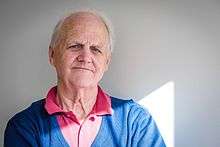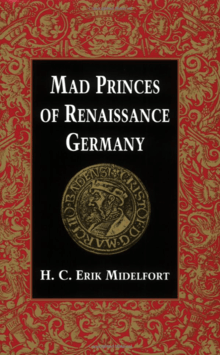H. C. Erik Midelfort
| H. C. Erik Midelfort | |
|---|---|
 | |
| Born |
Hans Christian Erik Midelfort April 17, 1942 Eau Claire, Wisconsin |
| Nationality | USA |
| Alma mater | Yale University |
| Occupation | Scholar, Author, Professor Emeritus of History and Religious Studies at UVA |
| Known for | German Reformation and the history of Christianity in Early Modern Europe |
| Notable work |
Mad Princes of Renaissance Germany A History of Madness in Sixteenth-Century Germany Exorcism and Enlightenment: Johann Joseph Gassner and the Demons of 18th-Century Germany'’ |
Hans Christian Erik Midelfort (born 1942), is C. Julian Bishko Professor Emeritus of History and Religious Studies at the University of Virginia. He is a specialist of the German Reformation and the history of Christianity in Early Modern Europe.[1]
Midelfort was born in Eau Claire, Wisconsin and attended Yale University where he obteined a Bachelor of Arts in History in 1964. He remained at Yale for graduate studies in History under the supervision of Jaroslav Pelikan and other noted scholars such as Hajo Holborn, J. H. Hexter, and Edmund S. Morgan. Midelfort graduated from Yale University in 1970. His first published work Witch Hunting in Southwestern Germany, 1562–1684: The Social and Intellectual Foundations [2] was published by Stanford University Press, and was awarded the 1973 Gustav O. Arlt Award in the Humanities by the Council of Graduate Schools.
Midelfort was a professor at Stanford University between 1968 to 1970, and he has also acted a visiting scholar at University of Bern, Universität Stuttgart, Harvard University, and at Oxford University where he was a visiting scholar at Wolfson College and visiting fellow at All Souls College. Midelfort was member of the Corcoran Department of History at the University of Virginia from 1970 until his retirement in May 2008 when he delivered his final undergraduate lecture on the topic of "Magic and Modernity".
In addition to his early work on witchcraft, Midelfort is best known for "Mad Princes of Renaissance Germany"[3] and A History of Madness in Sixteenth-Century Germany.[4] Both studies on madness were awarded by the Sixteenth Century Society and Conference with the Roland Bainton Prize for the best book of the year in History and Theology. Midelfort is one of the two scholars to win the award a second time. Phi Beta Kappa gave its Ralph Waldo Emerson Award to A History of Madness in Sixteenth-Century Germany. More recently, Midelfort published Exorcism and Enlightenment: Johann Joseph Gassner and the Demons of 18th-Century Germany[5] which emerged from his time as lecturer-in-residence as the Terry Lecturer in Yale University.
Because of his extensive work in translation of secondary sources, Midelfort is also well known for strengthening connections between his German and American colleagues. Among the seminal works Midelfort translated from German on German Reformation are Peter Blickle’s The Revolution of 1525: The German Peasants’ War from a New Perspective,[6] and Bernd Moeller’s Imperial Cities and the Reformation, Three Essays.[7]
During his tenure as scholar Midelfort has been awarded grants from the John Simon Guggenheim Memorial Foundation and the National Endowment for the Humanities. Furthermore, in 2004, Midelfort was recipient of a festschrift, or commemorative volume, presented by German colleagues: Wider alle Hexerei und Teufelswerk: Die europäische Hexenverfolgung und ihre Auswirkungen auf Südwestdeutschland, eds. Sönke Lorenz and Jürgen Michael Schmidt. In 2008, Midelfort received second festschrift, Ideas and Cultural Margins in Early Modern Germany (eds. Marjorie Elizabeth Plummer and Robin Barnes). In the Spring of 2011, Midelfort was also awarded the Ellen Maria Gorrissen Prize from the American Academy in Berlin.
Most recently, a collection of Midelfort articles and other writings has been published as Witchcraft, Madness, Society, and Religion in Early Modern Germany: A Ship of Fools.[8]
H. C. Erik Midelfort is married to Anne McKeithen. They live in Charlottesville, Virginia.
Notes

- ↑ Burke, Peter. "Good Witches" The New York Book Review of Books, February 28, 1985.
- ↑ Midelfort, H. C. Erik, Stanford University Press. Standford California, 1972. English. ISBN 0-8047-0805-3
- ↑ Midelfort, H. C. Erik: Mad Princes of Renaissance Germany. University of Virginia Press. Studies in Early Modern German History. 1996. English. ISBN 0-8139-1501-5
- ↑ Midelfort, H. C. Erik: A History of Madness in Sixteenth-Century Germany. Stanford University Press; August 1, 2000. English. ISBN 0-8047-4169-7
- ↑ Midelfort, H. C. Erik: Exorcism and Enlightenment: Johann Joseph Gassner and the Demons of Eighteenth-Century Germany. Yale University Press - The Terry Lectures Series, 2005. English. ISBN 0-300-10669-6
- ↑ Blickle, Peter. "The Revolution of 1525: The German Peasants’ War from a New Perspective". Translated by H. C. Erik Midelfort in collaboration with Thomas Brady. The Johns Hopkins University Press, 1985. English. ISBN 0-8018-3162-8
- ↑ Quintero, Fernando: Why Witches Were: Townsend Center Lectures Explore Factors Which Led Societies to Identify and Persecute Witches Throughout History. The Regents of the University of California.
Moeller, Bernd: Imperial Cities and the Reformation: Three Essays. Translated by H. C. Erik Midelfort in collaboration with Mark U. Edwards. Labyrinth Press, 1982. ISBN 0-939464-04-7 - ↑ Ashgate Pub Co. June 13, 2013.
References
- Cocran Department of History, University of Vitginia
- The Dwight H. Terry Lectureship
- Labyrinth Press
- John Simon Guggenheim Memorial Foundation
- The Johns Hopkins University Press
- University of Virginia Press
- Stanford University Press
|